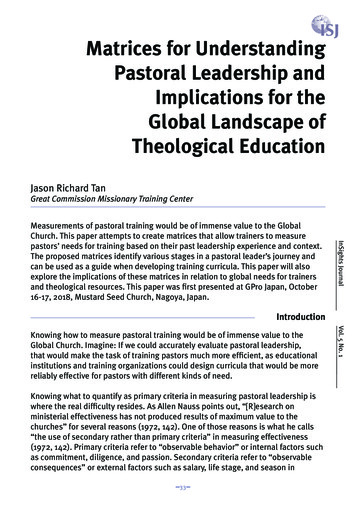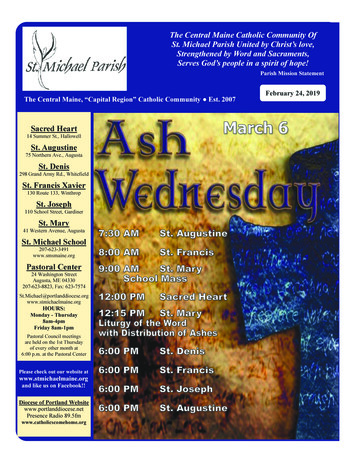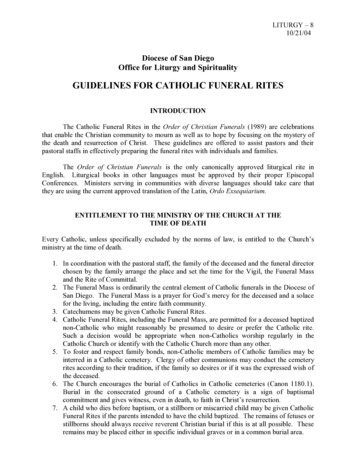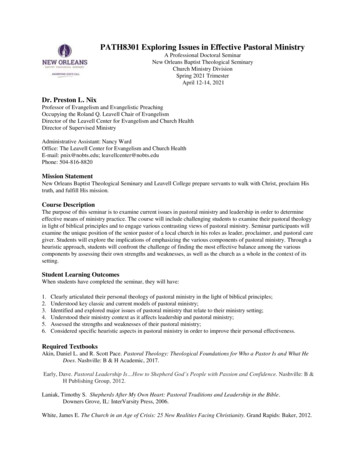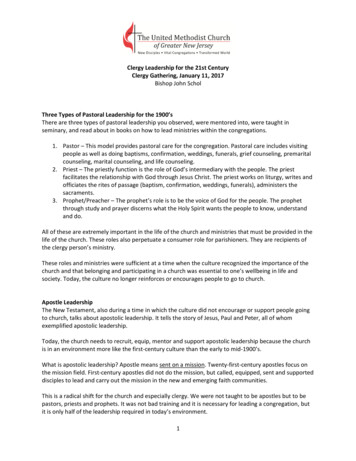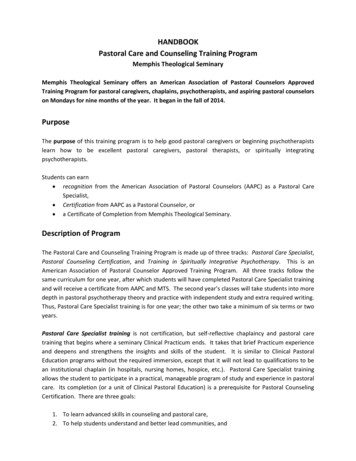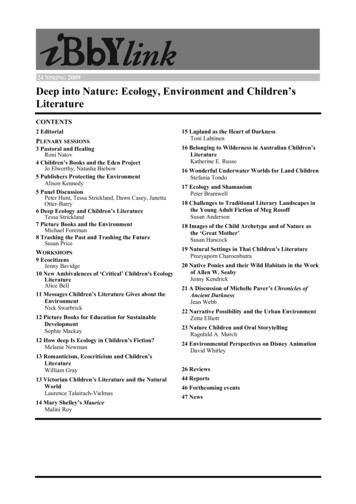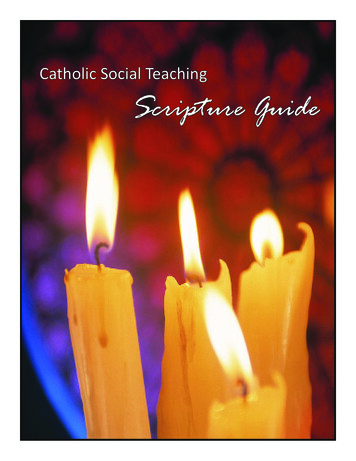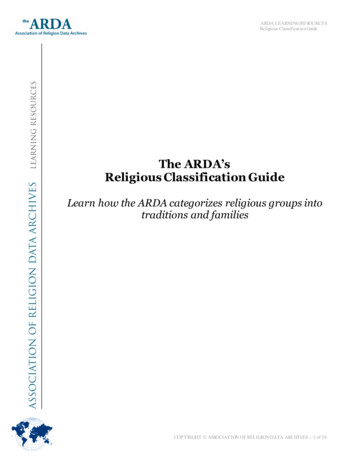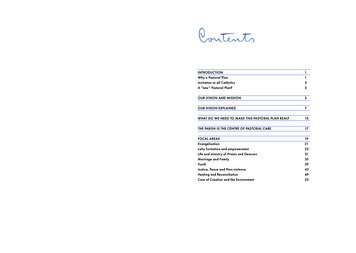
Transcription
ContentsINTRODUCTION1Why a Pastoral Plan 1Invitation to all Catholics 3A “new” Pastoral Plan? 3OUR VISION AND MISSION 5OUR VISION EXPLAINED 7WHAT DO WE NEED TO MAKE THIS PASTORAL PLAN REAL?15THE PARISH IS THE CENTRE OF PASTORAL CARE17FOCAL AREAS 19Evangelisation 21Laity formation and empowerment25Life and ministry of Priests and Deacons31Marriage and Family 35Youth 39Justice, Peace and Non-violence43Healing and Reconciliation 49Care of Creation and the Environment53
IntroductionW H Y A PA S TO R A L P L A N ?When we want to do something, we make a plan.When the Father, theWord and the Holy Spiritsummoned creation intobeing, God had a plan.“For he has made known to us in allwisdom and insight the mystery of hiswill, according to his purpose whichhe set forth in Christ as a plan for theassist those who have losttheir way, care for thestrong, ensure food forthe journey, avoid what isharmful, deal with dangerand provide for the future.fullness of time, to unite all things in him,things in heaven and things on earth.”Ephesians 1:9-101At every moment Godinvites us to play a part inthe unfolding ofthat plan.My plans for you are peace and notTo be pastoral is to lookafter other people ratherthan yourself, to look outfor them before looking atyour own wants; to lookfor the lost, bandage thewounded, carry the weak,“We who are strong ought to bear withdisaster, a future full of hope.Jeremiah 29:11the failings of the weak, and not toplease ourselves; let each of us pleasehis neighbour for his good, to edify him.”Romans 15:1A Pastoral Plan for theChurch does all of thisand more, both within theChurch community andfor the people, society andworld around us. A PastoralPlan helps and guidesus all as we listen andrespond to the leading ofthe Spirit, as we enter intothe Father’s plan for ourChurch and our world; aswe are missionary disciplesof Jesus in the present andas we let the Spirit guide usinto the future.“I myself will search for my sheep . Iwill seek the lost and I will bring backthe strayed, and I will bind up thecrippled and I will strengthen the weakand the fat and the strong I will watchover; I will feed them in justice.”Ezekiel 34:11, 15-16INTRODUCTION2
INVITATION TO ALL C ATHOLICSThe Bishops identified eight priorities for the life and mission of the Church inSouthern Africa.They asked the then Department for EVANGELISATION of the SACBC to leadthe process.We invite each Catholic, and all Catholic Communities within our Conference area,in their own context, to study, discuss and decide how to implement this PastoralPlan.Study sessions should be arranged in all Parishes, groups and movements.Implementation of this Pastoral Plan will be ongoing, monitored and evaluated.This Consultation was conducted in three phases , between 2011 and 2015, and thethird phase included Lenten ReflectionsThe Council for Evangelisation will regularly review and evaluate how our PastoralPlan is being received and implemented.After much input, reflection, discussion and prayer, the Bishops approved a VisionStatement and Mission Statement for the Pastoral Plan.A “ N E W ” PA S TO R A L P L A N ?About 30 years ago, in 1989, the Southern African Catholic Bishops Conference(SACBC) adopted and began to implement the first Pastoral Plan, which was calledCommunity Serving Humanity. Many of you will remember this Plan.In 2010 the Bishops decided that the Catholic Church in Southern Africa needed tocreate a new Pastoral Plan.3A team coordinated by Mgr. Barney McAleer conducted two widespreadconsultations, in parishes and other organisations within the Church. This teamgathered the concerns and ideas of all who took part in the consultation. From this,six areas of mission emerged.A at a meeting of the Council for EVANGELISATION in May 2017, a task teamwas appointed to study all this material and compose a first draft of the proposed newPastoral Plan to be presented to the Plenary of the SACBC held in August 2017.This CONCEPT Pastoral Plan is the work of the Drafting Committee afterconsidering the in-put of the Bishops in their Plenary of August 2017, and thecomments of the Council for Evangelisation in the November 2017 and January2018 meetings. It has been authorised by the Bishops in Plenary of January 2018to be released for study and comment by Priests and Religious and Laity through thedifferent organs of the dioceses.The intention of the Bishops is that Dioceses begin to look at their own programmesand pastoral plans in the light of this Concept Pastoral Plan.INTRODUCTION4
Our Vision andMissionOur Pastoral Plan invites communities to be and become anE VA N G E L I S I N G C O M M U N I T YSERVINGANDGOD,ALLHUMANITYCREATION .Let us ask God to inspire us to be generous and courageousenough to choose thatWe, the Church, the family of God in Southern Africa,commit to work together with others for the good of all,by responding to the cry of the poor and the cry of the earth,through Worship, Proclamation of the Word of God,Formation, Advocacy, Human Developmentand Care of Creation5OUR VISION & MISSION6
Our VisionexplainedEVAN GELISIN GC O M M U N I T YS E R V I N GGOD,“Look I am doing something new!”Isaiah 43:19To EVANGELISE is to do what Jesus did and what Jesus is still doing. It isannouncing something new, important and life changing, such as telling good news,bringing the truth about the Father who loves us all, bringing hope, creating joy,being a channel of the grace and power of God to change us and our world, openingourselves to the Holy Spirit, and uniting ourselves with the Son.It is assuring everyone there is life on the other side of death;that suffering can bring transformation;that we are immensely loved;that love is stronger than evil;that forgiveness and reconciliation bring inner peace;that heaven is real!There are many ways to evangelise.New ways arise all the time to meet new needs and new situations.Spirit is ever creative, forever prompting responses to new situations.H U M A N I T Y& ALL CREATION7A COMMUNITY is a group of people who belong to each other, share life andcare for one another. A community has a purpose. Every community which doesgood, participates in the love, life and action of the The Holy Trinity.OUR VISION & MISSION8
Our VisionexplainedI chose you! Follow me! Listen!John 15:16; Mark 1:17 & John 21:22; John 10:27EVAN GELISIN GC O M M U N I T YS E R V I N GGOD,H U M A N I T Y& ALL CREATION9An EVANGELISING COMMUNITY is a community of missionary disciplesof Jesus, busy with God’s work. An evangelised person or community has heard theGood News about Jesus and tries to live as his disciples. An evangelising communitytells the Good News about Jesus to others. It keeps on trying to do good all the timefor its own members, for others, and for our common home, our planet Earth.An EVANGELISING COMMUNITY is always busy serving God, humanity andall creation.The Father is still working on His plan! Creation is God’s project!GODWe already know about God, Father, Son and Holy Spirit.HUMANITYAll of us human beings without any exception whatsoever.ALL CREATION The whole created universe.For each one it means that part of creation we live in; which we move about in; wherewe have an impact on the environment.OUR VISION & MISSION10
Our VisionexplainedW E , T H E C H U R C H , T H E FA M I LYTHE FAMILY OF GOD is us, brothers and sisters of Jesus, the first-born Son;sons and daughters of the Father; a family, not by human genes and DNA, but byfaith, baptism and the Holy Spirit and sharing at the table with Jesus.TO WORK TOGETHER: Not working alone; a community of communities.TO WORK TOGETHER WITH OTHERS: With those who belong to any faithor none. With anybody!FOR THE GOOD OF ALL: Like God, we exclude no one. We include each one.Sometimes we call this ‘the common good’.OF GOD IN SOUTHERN AFRICA,COMMIT TO WORK TOGETHER WITHOTHERS FOR THE GOOD OF ALL, BYWe hear and respond to the CRY OF THE POOR. Many of us who hear or readthis are poor. Many of us are not. Many families and people among us and aroundus are poor, marginalised, even helpless or destitute.1 How can we who are poorrespond? How can we who are not poor respond?RESPONDING TO THE CRY OF THEPOOR AND THE CRY OF THE EARTH,We hear and respond to ‘THE CRY OF THE EARTH’: our planet and theenvironment, our common home which is being damaged.2T H R O U G H WO R S H I P, P R O C L A M AT I O NOF THE WORD OF GOD, FORMATION ,ADVOC ACY, HUMAN DEVELOPMENTWe listen and respond to GOD’S WORD and participate in the Eucharist andother sacraments, this is the heart and soul of the life of the Church. By this theChurch is created and sustained; Jesus pours himself, the Spirit, his life, grace,truth, mercy and power into the Church.AND C ARE OF CREATION .1211cf. Laudato si #49Laudato si Chapter 1OUR VISION & MISSION12
Our VisionexplainedW E , T H E C H U R C H , T H E FA M I LYOF GOD IN SOUTHERN AFRICA,COMMIT TO WORK TOGETHER WITHOTHERS FOR THE GOOD OF ALL, BYThrough ADVOCACY we raise our voices along with and on behalf of those of uswho have little or no power or voice; assisting, lobbying, representing, standing upfor what is right, acting in solidarity.RESPONDING TO THE CRY OF THEPOOR AND THE CRY OF THE EARTH,T H R O U G H WO R S H I P, P R O C L A M AT I O NBy HUMAN DEVELOPMENT we mean helping ourselves and each other todevelop our full potential as individuals and as community; physically, emotionally,intellectually, culturally, morally, vocationally, spiritually and in every way thathumanises us. This includes discovering and developing personal charismsand talents.OF THE WORD OF GOD, FORMATION ,ADVOC ACY, HUMAN DEVELOPMENTAND C ARE OF CREATION .13CARE OF CREATION means us looking after the soil, our water, our air, theplants, the animals, our dwelling places, our buildings, our resources, our sourcesof energy - the heritage of our children’s children and all the coming generations.OUR VISION & MISSION14
WHAT DO WE NEED TO MAKE THISPA S TO R A L P L A N R E A L ?If we commit ourselves to be a Church with this vision and this mission,we will need:FOCAL AREAS where we can devote our energies and resourcesThere are 8 Focal Areas, outlined on pages 9 to 20SPECIFIC GOALS to keep us focused and responsibleGenerally, these are set at the local level.SELF-UNDERSTANDING which promotes the values of one’sown culture and allows one to dialogue honestly and openly in aninter-cultural environmentFORMATION FOR EVERYONE.We should all gradually become missionary disciples in every area ofour everyday life.WAYS TO WORK towards these goalsThere are some practical suggestions on pages 21 onwardsREADINESS TO REACH OUT TO EVERYONE.Young and elderly, sick and healthy, local and foreigner, Christiansand those of other faiths; rich and poor, employed and jobless, well offand struggling, victims and perpetrators.KNOWLEDGE of existing resources AND ACCESS to theseVIBRANT AND RENEWED PARISHES incorporating andcollaborating with DIFFERENT GROUPINGS.INSPIRATION, IMAGINATION and CREATIVITY to createnew ways and find new resources15OUR VISION & MISSION16
T H E PA R I S H I S T H E C E N T R E O F PA S TO R A L C A R E“The PARISH is the presence of the Church in a given territory, anenvironment for hearing God’s word, for growth in the Christian life, fordialogue, proclamation, charitable outreach, worship and celebration.”Evangelii Gaudium #28The parish is not just how the Church divides up the world, it is also the people wholive their daily lives together in their shared belief. These small, geographical unitsenable the entire world to encounter Jesus Christ as believed, celebrated, and livedthrough the ministry of a community of believers.The parish is a home, a family, a community of communities.United with other parishes within a diocese, the parish is the centre to which theyouth and the adults come to receive the gift of love which is then shared and givento others.In looking at the parish, it is important to think about the place of each person inreceiving and giving the good news - the Bishop and the diocese, the parish priestand the laity.The parish creates a space for the people in it to give of their time, talents andexpertise, for the benefit of others, without feeling like they do not belong or areoutsiders. The parish focusses on encouraging and forming members so that theyreach out to others, even beyond the parish, with the Good News. It is a place ofsanctuary, where the thirsty rest on their journey to drink from the wells of life, and itacts as a ‘field hospital’ where people can go for healing.17Small Christian Communities, Parish Associations and Sodalities create a balancein the parish, by offering people chances to learn to know each other, and to findsupport from and give support to one another. Their commitment to the pastoralplan is invaluable.3The parish priest leads the parish. He is the vicar of the Bishop. There may also bean assistant priest or deacon, and there should a Parish Pastoral Council (PPC) anda Parish Finance Committee (PFC) who assist the parish priest.The Parish Pastoral Council (PPC) is made up of people who have been elected torepresent the members of their parish, their wards and their sodalities. There arealso a number of co-opted members appointed for their expertise and knowledgeof the parish. The constitution of the PPC will determine the number and how thisis done.The PPC should always be consultative, as its purpose is to promote the vision ofthe parish - where all those in it work together, according to the vision and missionof this pastoral plan. The PPC also coordinates the local parish with the vision andpolicies of the Diocese.Each Diocese needs a pastoral centre or some similar structure for the formation ofthe members of the parishes in catechesis, liturgy, marriage and family, as well asthe ongoing faith formation. The promotion of a “deeper vision of the parish isessential to fostering and coordinating the evangelising role of each member”.434“I invite all Christians, everywhere, at this very moment, to a renewedpersonal encounter with Jesus Christ”Evangelii Gaudium #3Refer Africae Munus #131Evangelii Gaudium #28INTRODUCTION18
Focal AreasEVANGELISATION (Area 1) is at the centre, and connects all the different areasCEVIRSET YNIUMMCOThe COMMUNITY, Areas 2 to 5 focus on the people in the parishes interactingwith this pastoral plan - the laity, the ordained, the family and the youth. These fourareas branch off from Area 1, and are underpinned by Areas 6, 7 and 8NIOTALISEGANVESERVICE, Areas 6, 7 and 8 look at the underlying principles in this Pastoral Plan- a commitment to Justice and Peace, another to Healing and Reconciliation, andfinally one to the Care of Creation.19FOCAL AREAS20
EvangelisationI CARE BECAUSE I AM LIVING THE GOOD NEWSThe spirit of the Lord has been given to me,for he has anointed me.He has sent me to bring the good news to thepoor,to proclaim liberty to captivesand to the blind new sight,to set the downtrodden free,to proclaim the Lord’s year of favourLuke 4:18 -21Our own experience of faith, of growing in it and of sharing it with others, beginswith hearing about Jesus and coming to know him personally. This personalrelationship with Jesus is fundamental to the pastoral plan, and all other areas flowfrom it.You are part of this experience of faith, deepening your friendship with Jesusthrough personal prayer and prayer together, helping others to know Jesus and tolove him, and developing your own conscience in a lived experience of the love forJesus.Priests and pastoral agents are part of this too, and their commitment flows fromthis fundamental experience of the love of Jesus. They provide a catechesis whichflows from this love, and which fosters and deepens this relationship with Jesus inyou and in all the faithful.21We can all, by becoming missionary disciples, make a difference on the sociopolitical, economic and cultural dimensions of persons and society.“The first step is personal dialogue, when the other person speaks andshares his or her joys, hopes and concerns for loved ones, or so many otherheartfelt needs”. 5It is the task of the Parish Pastoral Council (PPC) to find members who could be keyagents in spreading the Good News about Jesus.There are a few essential resources for the PPC to study and implement, includingSacred Scripture and the living Tradition of the Church, the Liturgy as lived andpractised, Catechism of the Catholic Church and the Compendium of SocialDoctrine of the Church.“Stand, therefore, having girded your loins with truth,and having put on the breastplate of righteousness,and having shod your feet with the equipment of the Gospel of peace,besides all these, taking the shield of faith, with which you can quenchall the flaming darts of the evil one.And take the helmet of salvation, and the sword of the Spirit, which isthe word of God.Pray at all times in the Spirit, with all prayer and supplication”Ephesians 6:14 -185Evangelii Gaudium #128E VA N G E L I S AT I O N22
WHAT C AN OUR COMMUNIT Y DO?It is the task of the Parish Pastoral Council (PPC) to find members who could bekey agents in spreading the Good News about Jesus. There are a few essentialresources for the PPC to study and implement, including Sacred Scripture and theliving Tradition of the Church, the Liturgy as lived and practised, Catechism of theCatholic Church and the Compendium of Social Doctrine of the Church.DO WE PRAY TOGETHER?HOW CAN WE DO THIS MORE?HOW DO WE SHOW THAT WE ARE LIVING THEGOOD NEWS?HOW CAN WE HELP OTHERS TO KNOW JESUS ANDLOVE HIM?23E VA N G E L I S AT I O N24
Laity formationand empowermentTHE L AIT Y CONNECT THE C HURC H TO THE WORLD,AND LIVE THE GOOD NEWS IN ITThere is variety of gifts but always the sameSpirit;there are all sorts of service to be done, butalways to the same Lord;working in all sorts of different ways in differentpeople,it is the same God who is working in all of them.The particular way in which the Spirit is given toeach person is for a good purpose.One may have the gift of preaching with wisdom, given him by theSpirit;another may have the gift of preaching instruction given him by thesame Spirit;and another the gift of faith given by the same Spirit;another again the gift of healing, through this one Spirit;one, the power of miracles; another, prophecy;another the gift of recognising spirits;another the gift of tongues and another the ability to interpret them.All these are the work of one and the same Spirit,who distributes different gifts to different people just as he chooses.1 Corinthians 12:1-1125The Church is a leaven in the world – where the lay people live and bring the GoodNews of Jesus. They gather as Church on Sundays and they are then sent out intotheir daily lives in the world.“The laity, by their very vocation, seek the Kingdom of God by engaging intemporal affairs and by ordering them according to the plan of God. Theylive in the world, that is, in each and in all of the secular professions andoccupations.They live in the ordinary circumstances of family and social life, fromwhich the very web of their existence is woven.They are called there by God, that by exercising their proper function andled by the spirit of the Gospel they may work for the sanctification of theworld from within as a leaven.In this way, they may make Christ known to others, especially by thetestimony of a life resplendent in faith, hope and charity.Therefore, since they are tightly bound up in all types of temporal affairs itis their special task to order and to throw light upon these affairs in such away that they may come into being and then continually increase accordingto Christ to the praise of the Creator and the Redeemer.”Lumen Gentium #31L AIT Y FORMATION & EMPOWERMENT26
Lay people, as part of this leaven, need many things. They need understandingand support in their struggle to be Christians wherever they are, formation inethics and the moral virtues such as honesty and integrity, and education on howto be responsible citizens in civic, social, economic and political life. They needopportunities for study and reflection together on how to tackle the many socialills in their communities, networks of support for each other in witnessing to theirChristian faith in word and behaviour, and formation in spirituality and prayer.“Lay men and women are called, above all, to holiness, a holiness which isto be lived in the world.”Africae Munus #129Similarly, at Diocesan level and National level, the Diocesan Pastoral Council andthe Laity Council guide and promote the formation and apostolate of the laity.“Dear members of the faithful: cultivate your interior life and yourrelationship with God, so that the Holy Spirit may enlighten you in allcircumstances. In order to ensure that the human person and the commongood remain effectively at the centre of all human, political, economic orsocial activity, deepen your union with Christ, so as to know and love himby devoting time to God in prayer and in the reception of the sacraments.Allow yourselves to be enlightened and instructed by God and by hisword.”Africae Munus #129“Don’t be afraid to set your sights higher, to allow yourself to be loves andliberated by God. Do not be afraid to let yourself be guided by the HolySpirit. Holiness does not make you less human, since it is an encounterbetween your weakness and the power of God’s grace. For in the words ofLeon Bloy, when all is said and done, ‘the only great tragedy in life, is notto become a saint’.”Gaudete et Exsultate #34What other needs do lay people have in the Church?Some of these needs are met through their own initiatives, and others throughthe Parish, the Diocese, National and International Church Associations andMovements.The support of the laity in their unique mission in the world is to be a special concernof the Parish Pastoral Council, and this is key to the new vision of the parish as thelocus of Pastoral Care.27L AIT Y FORMATION & EMPOWERMENT28
WHAT C AN OUR COMMUNIT Y DO?You can identify possible pastoral programmes that are needed, within the parishor diocese, for forming lay people in their role as evangelisers in the world, as wellas those programmes which coordinate the activity of the parish or diocese or localchurch in becoming the leaven in society, working towards the vision and missionof this Pastoral Plan.The laity are in the world, and a part of it. They have a responsibility to the world, tobuild it so that it can be better.“Today, many decision makers, both political and economic, assume thatthey owe nothing to anyone other than themselves. They are concernedonly with their rights, and they often have great difficulty in takingresponsibility for their own and other people’s integral development.Hence it is important to call for a renewed reflection on how rightspresuppose duties, if they are not to become mere licence.”Africae Munus #82You can identify possible pastoral programmes that are needed, within the parishor diocese, for forming lay people in their role as evangelisers in the world, as wellas those programmes which coordinate the activity of the parish or diocese or localchurch in becoming the leaven in society, working towards the vision and mission ofthis Pastoral Plan.HOW IS THE LAITY EMPOWERED TO ‘SANCTIFY THEWORLD’?WHAT OPPORTUNITIES ARE THERE FOR THE LAITYTO STUDY AND REFLECT ON THEIR CHALLENGES INOUR COMMUNITIES?WHAT SUPPORT NETWORKS CAN WESTRENGTHEN?WHAT OPPORTUNITIES ARE THERE FOR LAITYTO ATTEND SPIRITUAL FORMATION IN OURCOMMUNITIES?29L AIT Y FORMATION & EMPOWERMENT30
LifeandMinisteryofPriests & DeaconsPRIES TS AND DEACONS ARE C ALLED TO SERVEAND CARE FOR THE COMMUNITYI am the good shepherd:I know my own, and my own know me,just as the Father knows meand I know the Father;and I lay down my life for my sheep.John 10:14 -15Priests and deacons have a special calling to serve the People of God. It is a callingwhich begins with a relationship with Jesus, which matures through prayer andpersonal integration, and which is a calling to selfless service of other people. Thisministry requires a sense of being called by Jesus, of willingness to sacrifice likeJesus out of love for the Church, and a strong sense of service in the way of Jesus. Allof this is grounded in each person showing integrity, responsibility and professionalbehaviour of an adult.“In our world, ordained ministers and other pastoral workers can makepresent the fragrance of Christ’s closeness and his personal gaze. TheChurch will have to initiate everyone – priests, religious and laity – intothis ‘art of accompaniment’ which teaches us to remove our sandals31before the sacred ground of the other (cf. Ex 3:5). The pace of thisaccompaniment must be steady and reassuring, reflecting our closenessand our compassionate gaze which also heals, liberates and encouragesgrowth in the Christian life.”Evangelii Gaudium #169The relationship that priests and deacons have with Jesus is shown through the waythat they live a life of prayer, alone and with others, and that they strive to live anexemplary moral and Christian life; it is seen through their positive relationshipswith other people, in their deep-rooted habit of service, and the responsibility theyhold in personal life, parish and society.How can our community respond to a vocation to the ordained ministry?Parishes and Dioceses can organise programmes for nurturing a spirit of serviceand commitment which would assist young people in discerning a vocation to thePriestly and Religious life. At the heart of these programmes would be sharing theGood News with others, and it is important that intellectual formation and personalgrowth accompany growth in faith and wisdom.There are some key elements in formation and on-going formation of those whomight be called, including growing familiarity with sacred Scripture, the word ofGod which you read and hear, daily meditation upon the Word of God, appreciationof the sacraments and liturgy, increasing knowledge of the Catechism and theLIFE AND MINIS TRY OF PRIES TS & DEACONS32
teaching of the Church, particularly the social teaching.6 Priests and deacons havean indispensable task in the formation of future clergy.“By devoting yourselves to those whom the Lord entrusts to you for theirformation in Christian virtues and their growth in holiness, you not onlywin them to the cause of Christ but also make them [activists in] a renewedAfrican society. Given the complex situations that you encounter, I ask youto deepen your life of prayer and your ongoing intellectual and spiritualformation. You will then be capable of forming the members of theChristian community for whom you are immediately responsible, so thatthey can become authentic disciples and witnesses of Christ.”WHAT C AN OUR COMMUNIT Y DO?The relationship that priests and deacons have with Jesus is shown through the waythat they live a life of prayer, alone and with others, and that they strive to live anexemplary moral and Christian life; it is seen through their positive relationshipswith other people, in their deep-rooted habit of service, and the responsibility theyhold in personal life, parish and society.Africae Munus #109HOW CAN OUR COMMUNITY SUPPORT THOSEWHO ARE CALLED TO MINISTRY?WHAT SHOULD A PRIEST OR DEACON DO TOSUSTAIN HIS VOCATION AND MINISTRY?HOW CAN OUR COMMUNITY PROMOTEVOCATIONS TO THE ORDAINED MINISTRY?WHAT OPPORTUNITIES ARE THERE FORDISCERNMENT OF PRIESTS AND DEACONS?633Cf. Africae Munus #109LIFE AND MINIS TRY OF PRIES TS & DEACONS34
Marriage andFamilyT H E FA M I LY I S T H E H E A R T O F PA S TO R A L C A R E ,BEC AUSE ITS BASIS IS LOVEHe then went down with them and came toNazarethand lived under their authority.His mother stored up all these things in herheart.And Jesus increased in wisdom, in stature, andin favour with God and men.The experience of the joy of love begins with the initial encounter with each otheras a couple and matures like the wine of Cana which was of the best quality. A familywhich has the experience of Jesus at its centre becomes a source of joy and strengthfor others. In this way the family brings the Good News to other families and becomesthe perfume of the Holy Spirit in society.“Marriage is likewise a friendship marked by passion, but a passion alwaysdirected to an ever more and stable and intense union. This is because‘marriage was not instituted solely for the procreation of children’ butalso that mutual love ‘might be properly expressed, that it should growand mature’.”Amoris Laetitia #125“Indeed, the grace of the sacrament of marriage is intended before all else‘to perfect the couple’s love’”Amoris Laetitia #89Luke 2:51-52“The mystery of the Christian family can be fully understood only in thelight of the Father’s infinite love revealed in Christ, who gave himself upfor our sake and who continues to dwell in our midst, the living Christ whois at the heart of so many love stories.”Amoris Laetitia #59“Such a love, bringing together the human and divine, leads the partnersto a free and mutual self-giving, experienced in tenderness and action, andpermeating their entire lives.”Gaudium et Spes #4935Reflecting on the ‘lyrical passage of St Paul’, (I Corinthians 13:4-7) the Pope leadscouples in reflecting on the ways in which love shows itself:LoveLoveLoveLoveLoveis patientis at the service of othersis generousforgivesrejoices with othersLove is not jealousLove is not boastfulM A R R I AG E & FA M I LY36
Love is not rudeLove is not irritable or resentfulLoveLoveLoveLovebears all thingsbelieves all thingshopes all thingsendures all thingsTo help families grow, the Parish Pastoral Council and the Diocese attend to specificneeds7. They walk with families from the beginning, and help in the nurturing andeducation of children. They provide the family with the formation it needs to bepart of the mission of evangelisation,
7 8 Our Vision explained EVANGELISING COMMUNITY SERVING GOD, HUMANITY & ALL CREATION OUR VISION & MISSION To EVANGELISE is to do what Jesus did and what Jesus is still doing. It is announcing something new, important and life changing, such as telling good news, bringing the truth about the Father who loves us all, bringing hope, creating joy,
